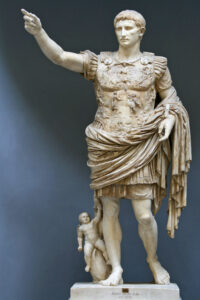
Hi. I’m back again, for better or for worse. Over the past few weeks I have immersed myself in reading but have finally come to a point where I need to pause and take stock. The book I have to blame for pulling me up and forcing me to stop and think afresh is König Herodes : der Mann und sein Werk by Abraham Schalit — published way back in 1969. (I don’t read German but thanks to new technologies I made short work of translating it.) Although Schalit does not address Christian origins his study of King Herod did open up for me a fresh historical perspective through which to re-interpret so much of the diverse material that makes up our earliest Christian sources.
I don’t read German, as I said, and I was of all possible ways alerted to König Herodes through my reading of an essay in another foreign language, modern Hebrew. This one was made available through an international library supply service supplemented by my text-reading and translation technologies: Levine, Israel L. “Magemoth Meshihioth Be-Sof Yemei Ha-Bayith Ha-Sheni (= Messianic Trends at the End of the Second Temple Period).” Messianism and Eschatology, edited by Zvi Baras, Zalman Shazar Centre for the Furtherance of the Study of Jewish History, 1983, pp. 135–52. Now that chapter is going to have to be converted into a new post here soon since I was slightly nonplussed to see it supporting another view I have expressed here, the view that there is little evidence to support the widespread “fact” that the Jewish rebellion of 66-70 CE against Rome was motivated by messianic hopes. That’s for another time.
The key idea in Schalit’s King Herod that has sent my mind into re-examining the question of Christian origins is the thesis that the Roman imperial idea, the ideology, if you will, propagated from the time of the first Roman emperor, Augustus, met with two responses among the Judeans:
- Judeans who identified themselves as necessarily separate from gentiles (think of circumcision, sabbaths, marriage restrictions) had nothing in common with the idea of a world united by the values and laws of Rome;
- Judeans who opposed the exclusivity of some of their brethren and were wide open to the idea of being a full part of a common humanity.
As for the first kind, the separatists, we see their views set out in the books of Ezra and Nehemiah. Recall those stories of “men of God” tearing out — not their own hair, but the hair of those Judeans who married gentiles. Those were the lucky ones: Phineas plunged a spear through one racially mixed couple. Daniel refused to pray even in secret when threatened with being thrown into the lion’s den. Sabbath-keepers chose to die rather than protect themselves from an enemy army on the sabbath day. Most of us are familiar enough with the relevant stories from the Old Testament and related books.
That familiarity can perhaps cloud the full significance of a quite different view of God and humanity that is expressed in other places in the same canon. Think of the original authors and readers of stories of Ruth, of Jonah, of Job. Ruth, a gentile, married an Israelite and became the great-grandmother of King David. Job is “from the land of Uz” and he speaks to a God who in the narrative appears to have no particular relation to Israel about a question of justice common to all humanity. Jonah has to learn a lesson about God’s acceptance of gentiles who repent and become righteous without any notion of the Mosaic laws. Several Psalms, Ecclesiastes supposedly by Solomon, and the Wisdom of Sirach further present a universalist view of God and the human experience.
Surely we have two opposing viewpoints among these Jewish authors. The second view could well find itself at home among Hellenistic writings of philosophers. The significance of that word “Hellenistic” deserves to be pondered at this point. It refers to the cultural world that belonged to the mixing of Greek and barbarian in the wake of Alexander’s conquests of the Persian empire. The Stoic philosophy that believed in the unity of humanity could trace its roots back to Alexander’s companion Aristotle. The ideas of some Jews or Judeans were evidently at home in such a world. Others were not.
What struck me so strongly about Schalit’s Herod was that those same two viewpoints among Judeans were very much alive and uncomfortable with each other in the time we associate with Christian origins. Herod (ca 37 to 4 or 1 BCE) was an Idumean who sought acceptance as a Jew. He was also a client king of Rome who owed his life and kingship to Augustus. Though King of Judea he embraced wholeheartedly the imperial program of Augustus. At this point, we need to backtrack just a little. . .

Augustus came to power as the final victor after a half-century of civil wars. His imperial propaganda machine went into overdrive. Augustus was the “saviour” and benefactor of “the inhabited earth”. Roman imperial rule was to become synonymous with “the good news” (it was a term of imperial propaganda) of peace, a restoration of “good old fashioned morality”, the spread of humanizing culture as expressed in the arts and literature and philosophy, and rule of law and justice for all. The Roman imperial idea took Alexander’s inheritance of uniting peoples under one divinely chosen ruler and magnified it beyond anything achieved by other successors. The Seleucid empire, for example, essentially took a “hands-off” approach towards subject peoples and let them do their own thing. Antiochus Epiphanes ran into trouble with religious zealots in Judea because he broke that tradition there.
You can probably see where I am headed with these ideas. Apologists have long posited that God prepared the world for Christianity in a way not very different from what I am proposing here — only without God and forethought.
Augustus could trust Herod to embody the full idea of the Roman civilizing mission and Herod did not fail him. Herod’s court attracted artists and intellectuals from other lands; his building program emulated the achievements in Rome itself; like Roman emperors he was the benefactor of the poor; he settled non-Jews in his Judean kingdom. But he could not have himself proclaimed as a god or even a demi-god as was the usual status of such leaders in his part of the world. He could, however, have his scribes fiddle with the genealogical records to show he was a descendant of David and hence — especially given his great accomplishments as king, expanding the borders and undertaking monumental building projects — potentially the promised Davidic Messiah. Unfortunately Herod had too many other faults to persuade enough others to that opinion. But even a powerful personality like Herod could not exist in an environment totally alien to everything he stood for.
The crucial point, it seems to me, is that Herod’s “Judaism” was in synch with that open or universalist idea we encounter in the books of Ruth, Jonah, Job, Ecclesiastes, Sirach etc. Herod failed to win the approval of the “legalists” and I cannot help but wonder if his failure was felt by others who were on his side with the more open kind of Second Temple religion.
There were evidently a significant number of Judeans who opposed their isolationist kin. And as evidenced by the Dead Sea Scrolls there were equally many Judeans who called down the judgment of God upon those of their kin who compromised with the Laws of Moses.
Now look again at our earliest Christian texts. Do not the gospels, certainly the Synoptic ones of Matthew, Mark and Luke, teach the highest values of the Greco-Roman culture? In case you’ve forgotten, have another quick look over
and
Recall the Stoic underlay throughout Paul’s epistles.
Recall the Gospel of Matthew opening up its account of Jesus by reminding readers of the sinners and gentiles — Tamar, Rahab, Ruth, Bathsheba — in Jesus’s ancestry.
Even recall the Roman imperial motifs in the gospels: The Gospel of Mark beginning with a line from Augustus’s propaganda about the “good news”; the imitation of emperor Vespasian’s miracles of healing the blind and lame; the inversion of the Roman Triumphal procession as Jesus is led to his crucifixion:
See also for further emperor-inversions in Jesus…
Recall, also, some of the earliest archaeological evidence we have for Christianity and how serene and “at home” it looks as if its creators were well-integrated members of society.
I have some sympathy for those who have attempted to locate Christianity’s origins in a Roman imperial conspiracy. But there is no evidence for such a hypothesis. There is even precious little evidence for the proposed motive behind such a conspiracy: a desire to pacify an unusually rebellious people by seducing the Jews into a religion of submission to Roman authority. The Jews were not particularly rebellious in comparison with others who chaffed at Roman rule. No, surely the initiative for a religious idea that did away with the exclusivist identity of many Judeans would have arisen among other Judeans of a different persuasion, of those who felt some embarrassment with their ethnic relatives.
How much more impetus must there have been for Judeans of that universalist mindset to present an “ecumenical” front to their pagan neighbours in the wake of the calamitous results of the Jewish wars in 70 and 135 CE.
Then recall how Jesus himself in the gospels is delineated as a fulfillment of all that can be described as the epitome of “Judaism”. I posted not long ago a lengthy series on one particular study that delves into the details of how the gospel Jesus is created out of so many texts and motifs of the Jewish Scriptures and Messianic viewpoints: Jésus-Christ, sublime figure de papier / Nanine Charbonnel
If some Judeans of the day did indeed attempt to sideline their “legalistic” family members by producing texts that unambiguously set the universalism of Ruth, Jonah, Sirach, and the rest front and foremost, they could not have done better than make a new successor to Moses, another Joshua, their focus. One might almost say that if Jesus had not existed it would have been necessary to invent him.
There is much more to add. One must, of course, account for persecutions and sectarianism in early Christian history. But the above is for now enough to set down the basis of initial thoughts on what might have led to the creation of Christianity.

